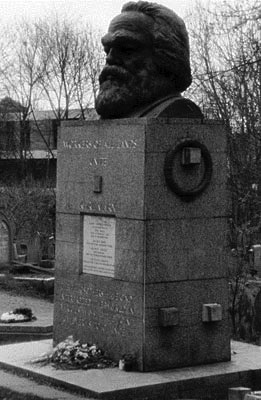When I lived in London, I took a lady friend on a stroll one
afternoon through the famous Highgate Cemetery. That famous
Victorian graveyard is a tourist destination because of the many
notable people buried there. Among them is Karl Marx, the famous
economics philosopher. With the recent upheaval in the global
economy and the rise of the Occupy movement – including protests in
Gilroy and Hollister – I’ve been thinking a lot about my excursion
to Highgate Cemetery.
When I lived in London, I took a lady friend on a stroll one afternoon through the famous Highgate Cemetery. That famous Victorian graveyard is a tourist destination because of the many notable people buried there. Among them is Karl Marx, the famous economics philosopher. With the recent upheaval in the global economy and the rise of the Occupy movement – including protests in Gilroy and Hollister – I’ve been thinking a lot about my excursion to Highgate Cemetery.
During our amble exploring the ivy-covered headstones, my friend and I came across Marx’s gravesite, which features a bust of the philosopher’s head. Surrounding the final resting place of the author of “Das Kapital” are the graves of many notable socialists. I made a joke of poor taste, calling this cemetery section “Commies’ Corner.” The remark earned me a glare of disapproval.
My visit to Marx’s grave connects metaphorically with the dramatic upheaval we’re seeing in the world’s economic state. With the European and American economies sputtering along, the corruption on Wall Street and the banking industry, the failure of the Congressional “super committee” to achieve a deal for reducing the national deficit and the loss of millions of American jobs, many argue we’re seeing the failure of American capitalism. The Occupy movement is another sign of the growing dissatisfaction with our current capitalistic system. Revolution is just around the corner, some say. The days of capitalism are numbered.
I have a hunch that the breakdown of the national economy isn’t that capitalism failed.
Rather, the American people failed in living up to the principles of capitalism – a free and fair marketplace powered by competition and innovative ideas. The reason this happened is that the vast majority of Americans – including many of our leaders – don’t understand how important it is to think like economists and make decisions for present and future benefit.
I’ve been disappointed with President Obama’s administration’s response to our economic crisis. To be fair, it was years in the making. Obama stepped into office in the worst recession in more than 50 years, one partly powered by two wars he inherited from the previous president.
And despite the severe handicap of a lack of leadership in both the Democratic and Republican parties in finding common ground, Obama did manage to achieve a lukewarm economic stimulus, prevent the toppling of our banking system and rescue the American auto industry.
Obama’s job approval rating now stands at about 43 percent. In comparison, the faltering economy in 1983 brought President Reagan’s job approval rating to 35 percent, and in 1992 the first President Bush’s approval rating sunk to 29 percent. All presidents know that the economy drives how the public perceives their performance.
The candidates for the GOP presidential nomination try hard to appease the Tea Party voters with simplified political slogans that have no connection to reality. Where are solid solutions, ideas that can revitalize the economy? And although the images of police pepper-spraying and arresting protestors provide exciting visuals on the nightly news, the Occupy movement has not yet accomplished anything significant in terms of political or economic progress.
What we need is direction from leaders who will inspire the American people to come together with a vision to revitalize our economy. What we need is guidance from leaders who understand how to think like economists, who understand the basic principles taught in Economics 101. We need leaders who understand that people take action and make decisions based on incentives, rewards or punishments that promote effective behavior. And those incentives do not have to be monetary. They can be pride in sacrifice and serving our nation. We need leaders who also understand that there’s no such thing as a free lunch. Scarcity fuels the law of supply and demand.
Most importantly, we need leaders who understand that America’s greatest economic engine is innovations that increase efficiency and quality of life and reduce wasting time and energy. America has faced economic decline before. We’ve come out of our tailspins when we moved toward new ideas that, powered through capitalism, reshaped our economy by building new infrastructures such as railroads, highways, communication systems and the Internet.
Karl Marx is dead. Long live capitalism.










